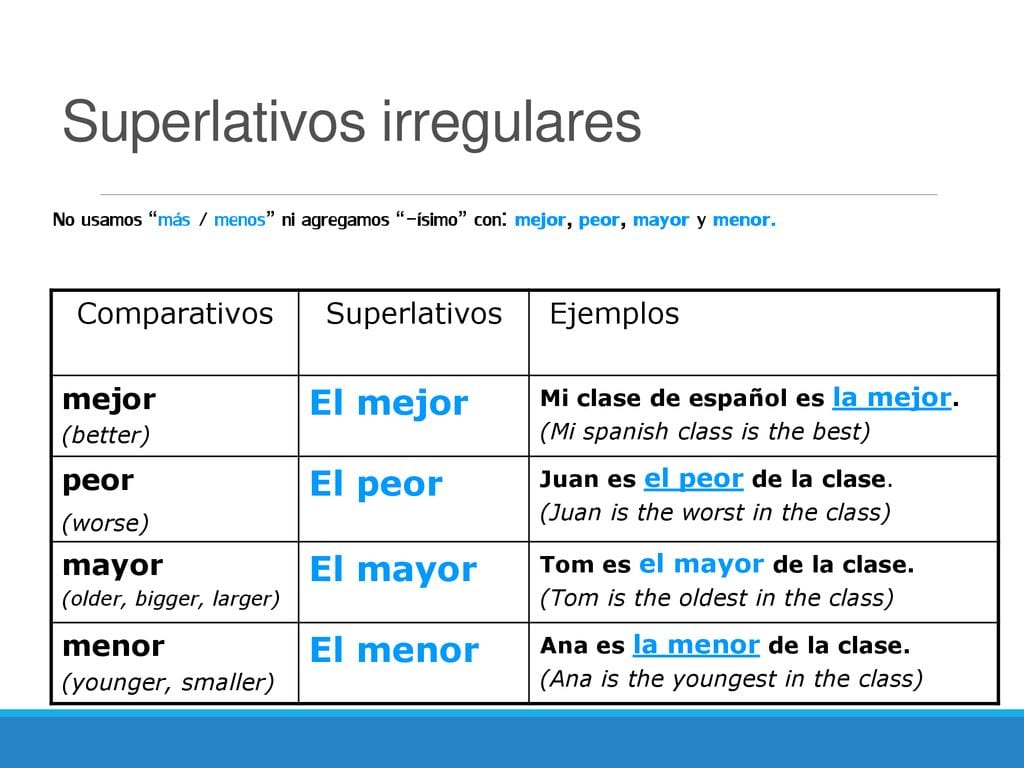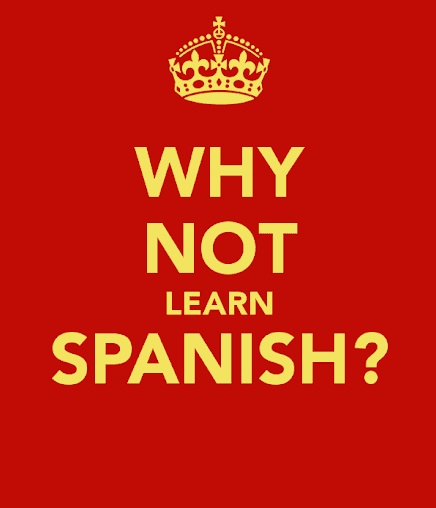To effectively discuss the best and most challenging aspects of learning a new language in Spanish, mastering the superlative form of Spanish adjectives is essential. Unlike English, which often requires adding “-est” to an adjective, Spanish superlatives follow a simpler pattern. This concept is crucial when you’re comparing more than two nouns, highlighting the utmost degree among a group. Our guide will dive straight into the pattern you need to learn, making it easier to form superlatives in Spanish compared to English.
Let’s dive into the specifics and start enhancing your Spanish skills right now!
Spanish Superlatives Quick Guide
| Adjective | Superlative Form | English Equivalent |
|---|---|---|
| bueno | el/la mejor | the best |
| malo | el/la peor | the worst |
| grande | el/la mayor | the biggest |
| pequeño | el/la menor | the smallest |
| alto | el/la más alto/a | the tallest |
| bajo | el/la más bajo/a | the shortest |
| rico | el/la más rico/a | the richest |
| pobre | el/la más pobre | the poorest |
There are two types of superlatives: relative and absolute
- Relative: I am the youngest person on the team.
- Absolute: I am very young.
The relative superlative is used when describing the noun within the context of some larger group:
- I am the youngest person on the team.
- He is the best cook in the group.
- My brother is the strongest in his class.
The absolute superlative is not used to describe the noun in the context of a larger group:
- I am very young.
- That stove is super expensive.
- That cake was irresistibly tasty.
In English, we form the relative superlative by using the word “most” or adding “-est”
- Daniel is the fastest runner in my class.
- He is the most handsome of them all.
In Spanish, the relative superlative construction is similar to that of the comparative:
- definite article + noun + más/ menos + adjective + de
Take a look at the examples below:
| Spanish | English |
| Agustín es la persona más alta de la clase. | Agustín is the tallest person in the class. |
| El fútbol es el deporte más aburrido del mundo. | Soccer is the most boring sport in the world. |
| El pastor alemán es el perro más amable de todos. | The German Shepherd is the friendliest dog of them all. |
The absolute superlative for adjectives has three possible forms in Spanish:
- muy + adjective – muy inteligente
- sumamente + adjective – sumamente inteligente
- adjective + ísimo (-a, -os, -as) – inteligentísimo
| Spanish | English |
| El senador es muy serio. | The senator is very serious. |
| La situación es sumamente preocupante. | The situation is incredibly worrying |
| Este cable es larguísimo. | The cord is so long. |
Lastly, we must remember the irregular superlatives in Spanish. With these superlatives, we do not add the ending -isimo. Below are some examples:


Mastering Spanish Superlatives: Examples
1. Examples in Context: Spanish Superlatives in Daily Use
| Spanish Sentence | English Translation |
|---|---|
| El Everest es la montaña más alta. | Everest is the highest mountain. |
| Este es el mejor café de la ciudad. | This is the best coffee in the city. |
| Ella es la estudiante más inteligente de la clase. | She is the smartest student in the class. |
| Este es el día más feliz de mi vida. | This is the happiest day of my life. |
2. Common Pitfalls: Avoid These Superlative Mistakes
| Common Mistake | Correct Form | Explanation |
|---|---|---|
| Más mejor | Mejor | “Mejor” already means “better/the best”. |
| Más peor | Peor | “Peor” already means “worse/the worst”. |
| Más más alto | El más alto | Use “el más alto” for “the tallest”. |
| Más más inteligente | El/la más inteligente | Use “el/la más inteligente” for “the most intelligent”. |
3. Comparison with English: Understanding Superlatives Across Languages
| Spanish Structure | English Equivalent |
|---|---|
| el/la [adjective] más [noun] | the [adjective]-est [noun] |
| el/la mejor [noun] | the best [noun] |
| el/la peor [noun] | the worst [noun] |
| el/la más [adjective] [noun] | the most [adjective] [noun] |
4. Regional Variations: Superlatives Across the Spanish-Speaking World
| Region/Country | Superlative Example | Meaning in English |
|---|---|---|
| Spain | guay | coolest (informal) |
| Latin America | chevere | awesome/cool (informal) |
| Mexico | padrísimo | awesome/cool (very informal) |
| Argentina | copado | cool/nice (informal) |
5. Interactive Exercises: Practice Your Superlatives
“Fill in the blanks with the correct superlative form of the adjective in parentheses.”
- Este es el libro _ (interesante) que he leído.
- Ella es la persona _ (amable) de la oficina.
- Este coche es _ (rápido) del mundo.
- Juan es _ (bueno) jugador de fútbol del equipo.
6. Visual Aids: Quick Guide to Forming Superlatives
“Superlative Formation in Spanish”
| Base Form | Superlative Form | Meaning |
|---|---|---|
| rápido (fast) | el más rápido (the fastest) | |
| inteligente | el/la más inteligente (the most intelligent) | |
| pequeño (small) | el más pequeño (the smallest) | |
| rico (rich) | el más rico (the richest) |
These enhanced tables provide a comprehensive overview, practice opportunities, and clear examples for readers looking to master Spanish superlatives.
Now that we have concluded our lessons on comparatives and superlatives, you have the necessary tools to enhance your descriptions in Spanish. These tools will add richness and depth to your stories and anecdotes when chatting with old friends or meeting someone for the first time. Go give it a try by telling a story to your nearest Spanish speaking friend!


START YOUR SPANISH CLASSES TODAY
- University Spanish Courses in Argentina
- Learn Spanish in Malaga
- Malaga Summer Camp
- Learn Spanish in Milwaukee
- Profesores de ingles en Malaga
- Profesores de ingles en Buenos Aires
- Learn Spanish in Ottawa
- Spanish Tutor in Toronto
- Learn Spanish Online
- Argentina Study Visa
- Coorporate Spanish Classes
- Best Spanish School in Buenos Aires Argentina




